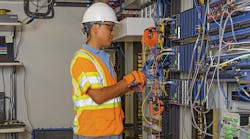On Wednesday May 30, education and workforce development practitioners from the World Bank visited the Odenton training facility of IEC-Chesapeake (Independent Electrical Contractors) to learn about an innovative partnership to prepare trainees for opportunities in the green economy. The World Bank delegation heard from the leaders of IEC's partnership with industry and Anne Arundel Community College about how the program started, and how it prepares trainees with relevant skills to meet the demand for green renewable energy.
IEC's renewable energy program, launched in 2009, trains students to design, install, and maintain solar photovoltaic systems. According to IEC-Chesapeake Executive Director, Grant Shmelzer, the program's success is a result of close coordination between key workforce development stakeholders - industry, training providers, education institutions.
"Our goal is to recruit, retain, and employ, and it is our partnerships that make that possible," said Shmelzer. "This visit is recognition of IEC's vision and hard work to find and capitalize on opportunities in our region to promote green economic growth."
The World Bank is bringing staff and participants from five countries to learn about how local workforce development models like IEC are developed and sustained to provide students with relevant technical and life skills that enables them to fill employers' skills needs. This is one area of interest within a weeklong workshop at the World Bank centered on the refining of its new diagnostic tool for analyzing a country's workforce development policies and institutions. The Workforce Development tool is part of the World Bank's wider SABER (Systems Approach for Better Education Results) Initiative that is helping countries identify actionable priorities for strengthening education systems which is fundamental for development and growth. The workshop marks the completion of the new SABER Workforce Development pilot phase which included studies of workforce development systems in Chile, Ireland, Korea, Singapore and Uganda.
In choosing to visit IEC, SABER-WfD leader and World Bank Education Adviser, Jee-Peng Tan wanted participants to see effective workforce partnerships in action. "The IEC model is a living example of how local partnerships can promote a demand-driven workforce development system - one that is able to respond to new market opportunities and deliver the technical and life skills employers are looking for," Tan remarked. "Workforce development systems are complex, and this often means that seeing is believing," she added.

